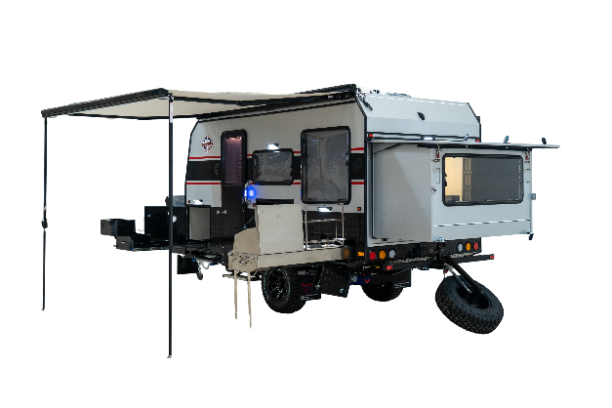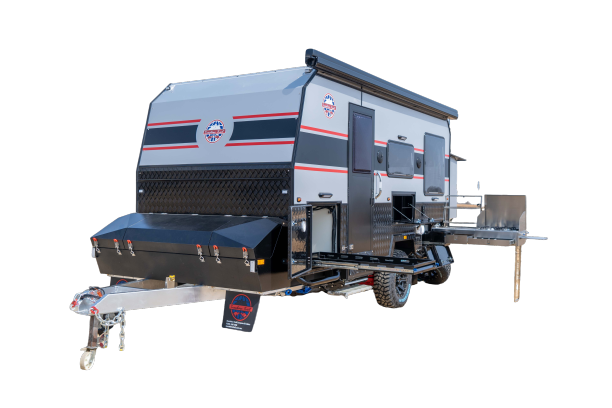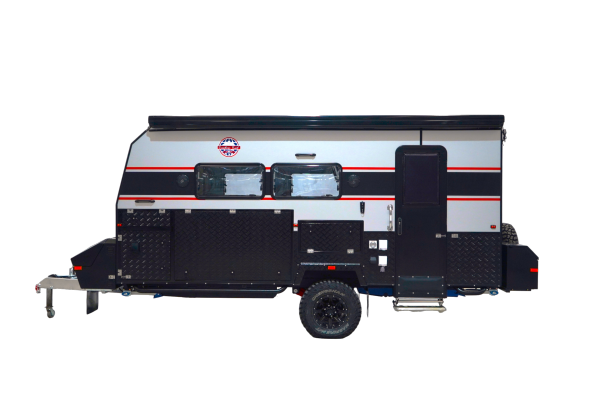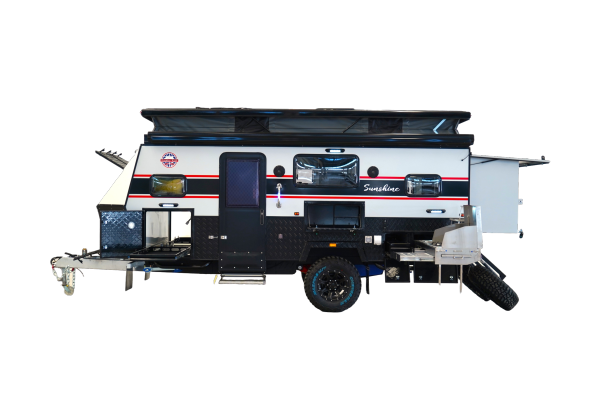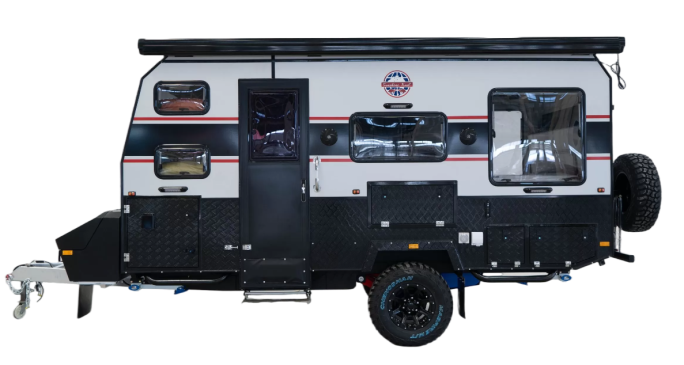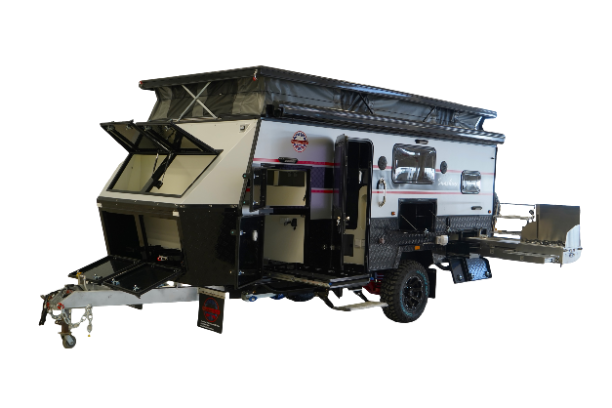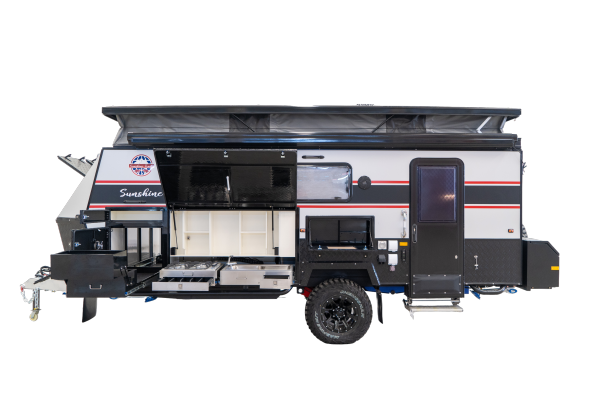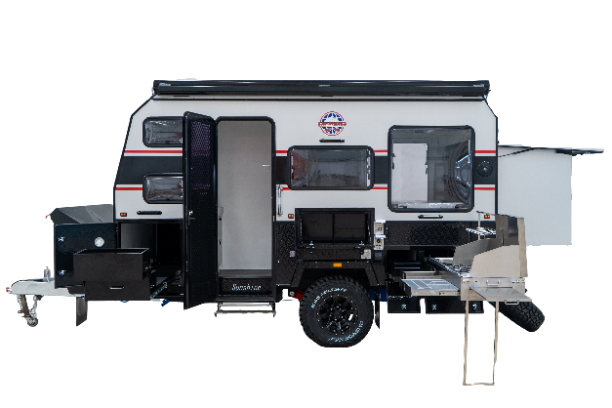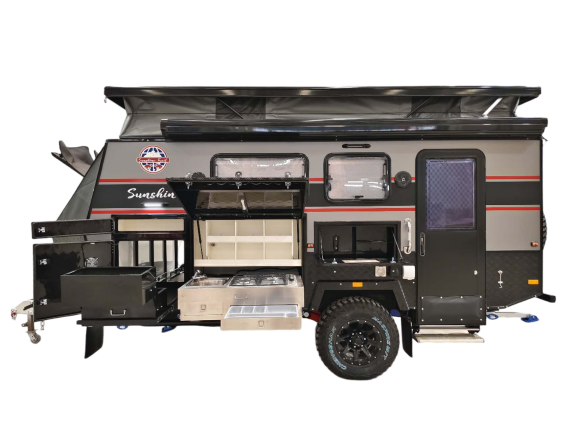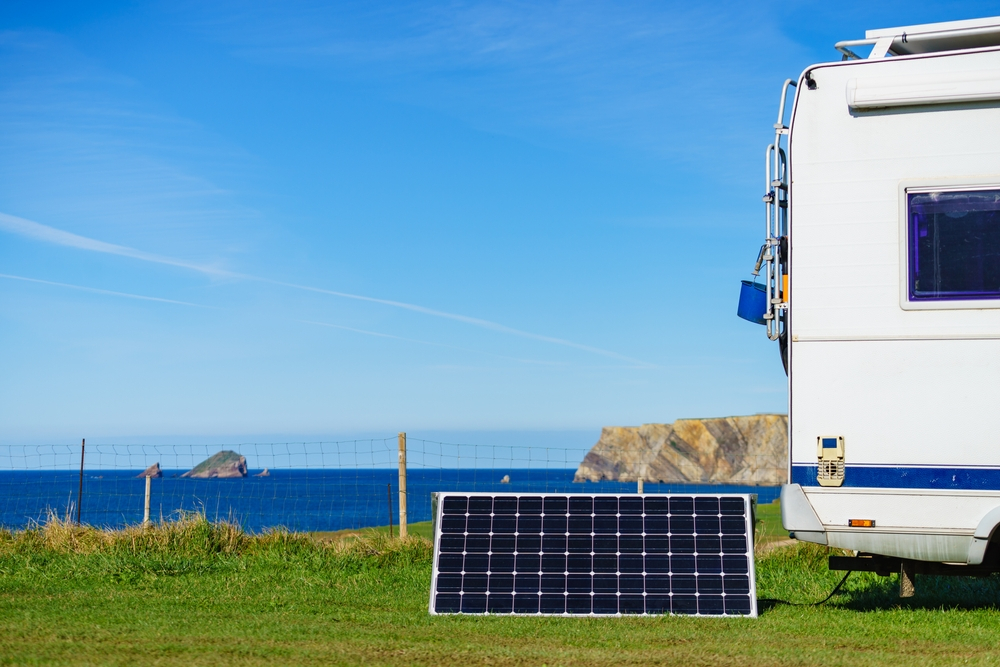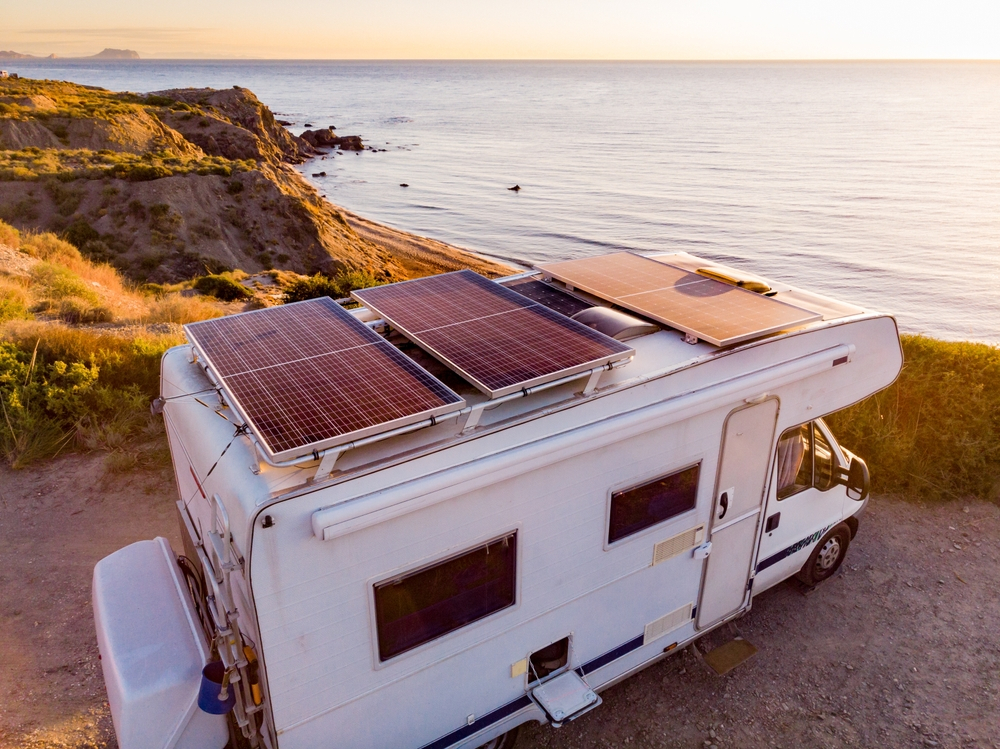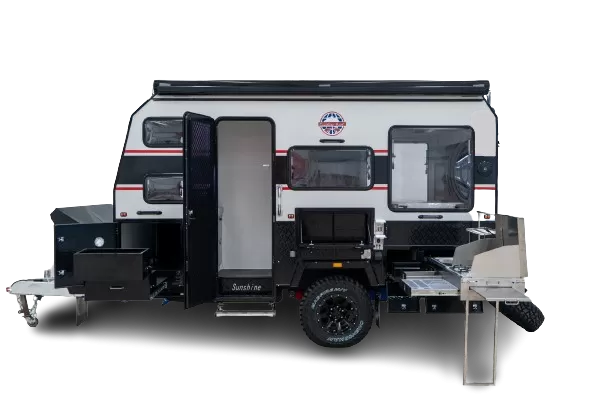How to Power a Caravan Off Grid?
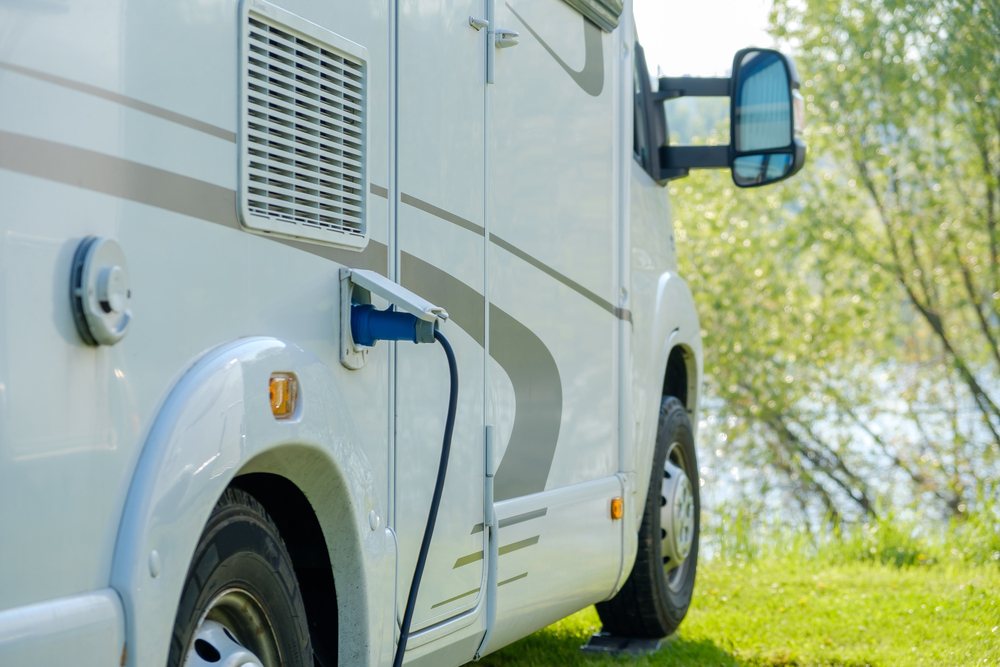
Imagine the freedom of traveling in best off grid caravans, exploring remote and off-the-beaten-path destinations without being tied down to traditional campgrounds or RV parks. When you’re out on the road in your caravan, especially in remote and off-grid locations, having a reliable power supply is essential.
In contrast to traditional camping at caravan parks with mains power, you must be self-sufficient to keep your off grid caravan running smoothly. Even when camping in remote areas, your off grid camping power supply will allow you to charge your off grid caravans’ battery, power your fridge, appliances, TV, and lights.
The feasibility and effectiveness of off-grid power solutions can vary based on your location, energy consumption, and budget. Plan and size your system accordingly to meet your specific needs while staying environmentally responsible and self-sufficient
In this guide, we’ll explore the various methods and components needed to power your caravan off-grid effectively or simply giving the answer of “How to Power a Caravan Off Grid” or “caravan off grid set up”?
Power a Caravan Off-Grid: Comprehensive Guide by Sunshine Trail
Solar Power
One of the most popular and eco-friendly methods for powering a caravan off-grid is solar energy. Solar panels can be installed on the roof of your off grid caravan, where they capture sunlight and convert it into electricity.
- Assess your electricity consumption to determine the size and number of solar panels required. You may need to consider appliances like lights, refrigerator, fans, and charging devices.
- Consult with a professional or follow DIY installation instructions to mount solar panels on your caravan’s roof. Ensure they are securely fasten and properly connect to a charge controller and battery.
- Invest in a high-quality deep-cycle battery to store excess energy generated by the solar panels. This battery will power your off grid caravan during cloudy days and nighttime.
- Install a charge controller between the off grid caravan solar system panels and the battery to regulate the charge and prevent overcharging or discharging.
- A power & best inverter for caravan is necessary to convert the DC electricity from the battery into AC electricity that can be used by your appliances and devices.
Wind Power
Wind power is another viable option for off-grid caravan lovers, especially for those traveling in windy regions.
- Park your caravan in a windy area where you can securely install a wind turbine. Elevated locations with consistent wind patterns are ideal.
- Purchase and set up a wind turbine capable of generating sufficient power for your needs. Connect it to a charge controller and battery just like with solar panels.
- Similar to solar power, use a deep-cycle camping battery setup and an inverter to store and convert the energy generated by the wind turbine.
Generator
For off-grid caravan power in less predictable conditions or as a backup option, a generator can be a reliable choice. Generators run on gasoline, propane, or diesel and can provide a constant source of electricity.
- Select a generator that matches your power requirements. Consider fuel efficiency, and portability when making your decision.
- Regularly service and maintain your generator to ensure it runs smoothly. Keep extra fuel on hand and adhere to safety guidelines.
- Generators can be noisy, so consider soundproofing measures or investing in a quieter model if noise is a concern.
Battery Systems
In addition to solar and wind power, you can also power your caravan off-grid by using a high-capacity battery system. Lithium-ion batteries have become popular for their durability and efficiency. Connect them to your vehicle’s alternator for charging while driving and pair them with solar panels for a comprehensive power solution.
While not the first choice for advanced setups, lead acid batteries can work for basic systems and require a simpler power management setup. Among lead acid batteries, AGM (absorbent glass mat) batteries are a preferred option.
For a battery of the same physical dimensions, a lithium battery can provide over three times much power and weighs around 60% less than an AGM battery (while still producing 30% more power!).
-
Inverters:
Most off grid caravan battery systems operate on a 12-volt direct current (DC) system. while household appliances use 240-volt alternating current (AC). An inverter is essential for converting the 12v DC power from your batteries into 240v AC power for your appliances, making them compatible with your caravan’s electrical system.
12v electricity is ideal for powering many items, including lights, water pumps, or refrigerators.
The 12v DC electricity is converted by an inverter to 240v AC, which is then distributed to the standard house power outlets in your off grid caravan. This entails that you may use electronics, charge appliances, and enjoy power exactly as you would at home.
-
DCDC Chargers:
DCDC chargers are designed to charge your batteries while you’re driving. They provide a convenient way to ensure your batteries are fully charged when you arrive at your off grid camping destination, even if iin cloudy days or minimal sun for solar charging.
Tip: Opt for energy-efficient appliances to reduce power consumption and prolong your off-grid stay. Consider low-wattage devices and appliances designed specifically for caravan use. LED lights, three-way fridges, and other caravan-specific appliances are excellent choices to maximize power efficiency.
How to Prepare Your Caravan or Trailer for Off-Grid Travel?
Setting up an off-grid caravan or camper trailer comes with numerous advantages. Perhaps the most enticing one is the opportunity to extend your stay in remote, breathtaking landscapes with fewer people around.
Additionally, the cost-effectiveness of off-grid travel adds to its appeal. Achieving self-sufficiency and comfort is surprisingly straightforward, often requiring only minor modifications to transition your caravan into an off-grid haven. Sometimes, all it takes is the addition of an extra battery or a solar panel.
What you should consider when preparing any caravan or trailer for off-grid adventures, look below:
Power:
Let’s begin with the most obvious aspect: power. Some travelers are content with powering essential appliances like a fridge and charging devices. While others seek all the conveniences of home, including air conditioning. Naturally, the more electrical devices you have, the greater the power requirement. Regardless of your power needs, having a Battery Management System (BMS) in your off-grid caravan setup is essential.
A BMS efficiently tackle incoming power to charge your caravan or trailer’s batteries, which, in turn, supply power to all your home comforts and devices. Additionally, it provides vital information about your power status, including battery levels, estimated charging time, remaining power duration, and even the amperage generated by your solar panels. Some advanced BMS units can even monitor your water tank levels.
Many modern caravans are pre-equipped for off-grid adventures, often featuring an integrated BMS.
Power Sources:
There are three common methods to charge your caravan or trailer’s batteries through the BMS, and most travelers utilize a combination of these methods while on the road: solar panels, vehicle alternator charging while driving, and mains power.
Solar: Solar panels, whether fixed on your caravan’s roof or portable for trailer setups, are cost-effective and efficient in sun-rich regions like Australia. They serve as a reliable source for powering essential devices during off-grid stays, although reliance on other sources may be necessary during cloudy periods.
Vehicle: You can cleverly tap into your vehicle’s 12V power through the alternator while driving. The BMS (or a separate DC to DC charger) can create an output current to charge and maintain your caravan or trailer’s battery.
Mains Power: This refers to the standard 240V power found in homes or caravan parks. Some travelers charge their batteries at home before embarking on a journey or periodically check into powered caravan sites for recharging.
Batteries
The heart of your power system lies in your batteries, which store the generated electricity. While lithium batteries are top-tier, their cost can be prohibitive for many. However, it’s crucial to acquire the best battery within your budget. Smaller setups with minimal power requirements can often thrive on solar and a single deep cycle battery. For larger power needs, consider investing in a pair of lithium batteries. These batteries provide power to your caravan or trailer’s 12V sockets. For devices requiring 240V power, an inverter serves as an intermediary.
Inverter
An inverter enables you to operate all the appliances you would typically use at home, such as charging laptops, camera batteries, or even using a toaster.
Water Management:
Ensuring an ample supply of drinking water and effectively managing grey water is vital for extended off-grid journeys. Consider installing a larger or secondary drinking water tank and a larger grey water holding tank if needed. Additionally, you can collect rainwater for various uses by employing a simple bucket kit under your caravan’s awning.
Toilet and Shower:
For prolonged off-grid stays, it’s beneficial to minimize the frequency of emptying your toilet and grey water. Composting toilets for caravans offer longer intervals between emptying compared to traditional cassette toilets. Showering can be managed by using shower tents, shower awnings, and 12V shower heads, eliminating the need for immediate access to facilities.
Food and Cooking:
To extend your off-grid adventures, consider reducing your battery drain by cooking with gas rather than relying on a microwave or electric stove. For refrigeration, 12V fridges like Engel models are efficient choices. Caravans equipped with three-way fridges offer flexibility, allowing you to switch between gases, 12V, or mains power based on your needs.
Climate Control:
Heating can be efficiently achieved with various diesel and gas heaters designed for water and space heating. However, cooling becomes challenging when air conditioning is required, as it consumes substantial power. If anticipating hot weather, it may be necessary to seek power at a caravan park or carry a generator. Nevertheless, managing without air conditioning is feasible by maximizing airflow through well-designed caravan layouts with screened windows and doors.
By considering these factors and making informed choices, you can enjoy comfortable and extended off-grid adventures with your caravan or trailer. Looking for camper caravans Australia or caravan for sale WA, Sunshine Trail is your trip partner. Plan smartly and get premium caravans in Perth.
Conclusion:
Off-grid caravan power requires careful planning and a financial investment in the right tools. Your power supply system should be customized to your unique needs and travelling style, whether you choose solar panels, wind power, generators, or a combination of these. Your off-grid experience will be improved by selecting the right parts, such as batteries, inverters, and energy-efficient appliances.
This will enable you to take advantage of remote off grid camping’s freedom while retaining home comforts. You can embark on unforgettable caravan adventures without being concerned about running out of power with the proper off-grid power supply setup.
Prioritize energy efficiency, maintenance, and environmental responsibility to make your off-grid caravan journey sustainable and enjoyable. Since a refrigerator is one of the most important appliances in your home, investing in a three-way fridge that can run on three different power sources is a great idea. When you’re on a powered site or using a generator, you can use 240v, 12v, or even LPG.
When you’re off the grid, these fridges give you flexibility and help you save resources. If you choose a compressor fridge, you must consider the power consumption of your 12v system. With the right setup and a sense of adventure, you’ll be well-equipped to embark on unforgettable off-grid adventures.
Tap Below And Get Our Best Picks For Your Dream Trip:

